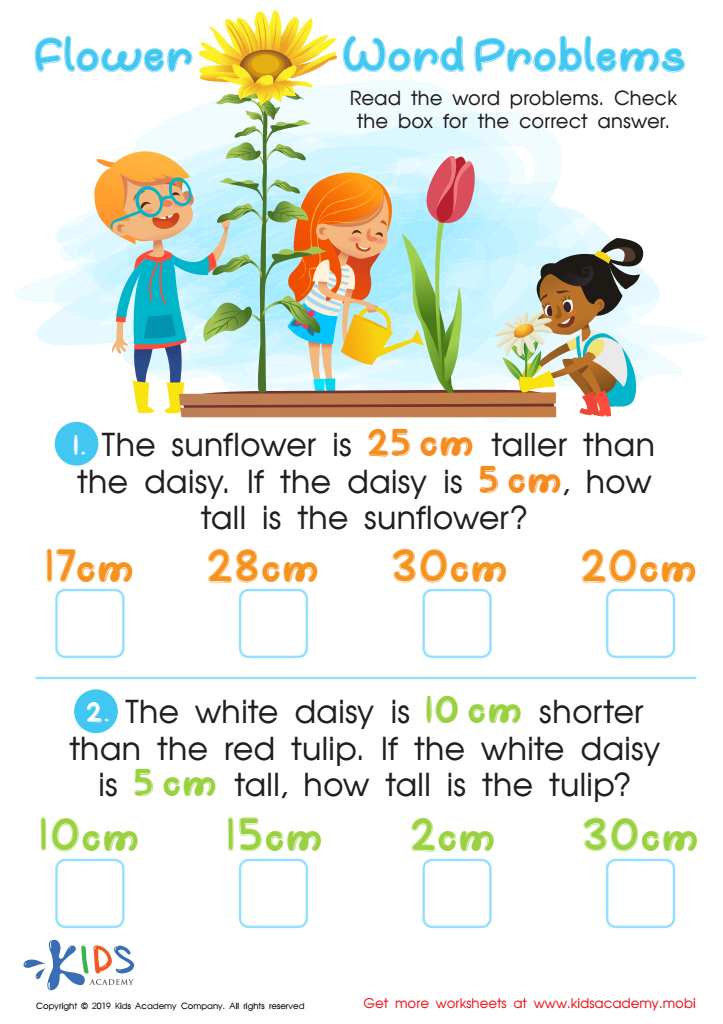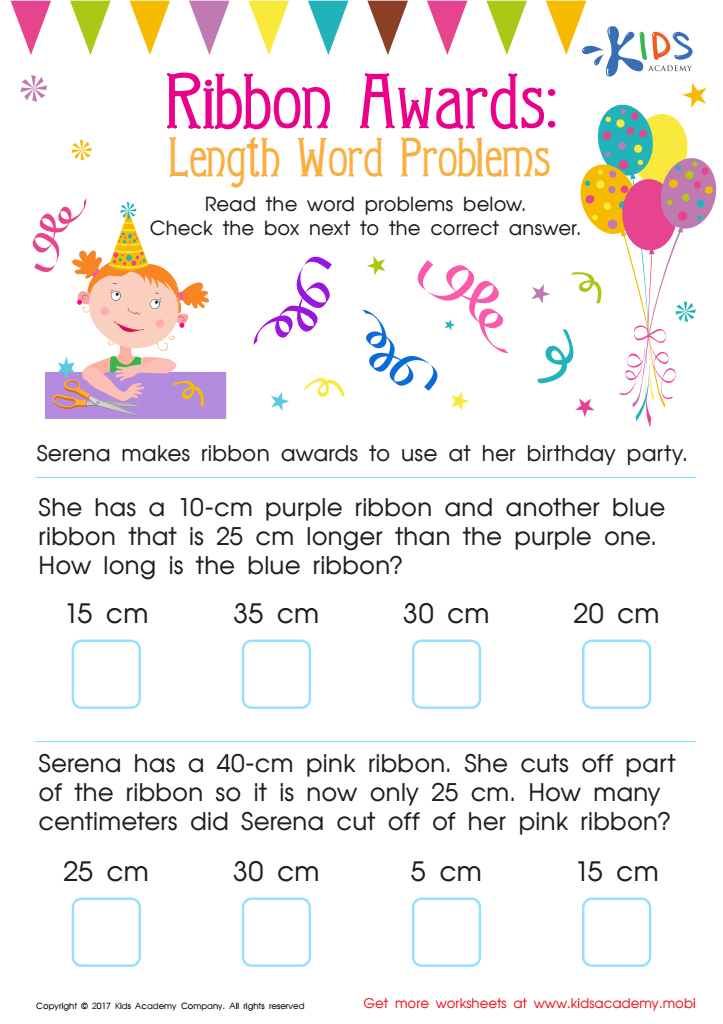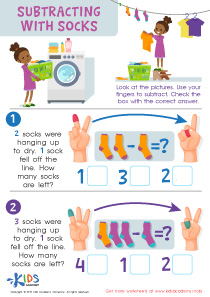Length and Mass Word Problems Worksheets for Ages 4-6
2 filtered results
-
From - To
Introduce your little learners to the exciting world of measurements with our Length and Mass Word Problems worksheets, perfectly tailored for children aged 4-6 years. These engaging, homeschool downloadable worksheets are designed to help young minds grasp fundamental concepts of measuring length and weight through fun and interactive problems. Each sheet is crafted to enhance understanding and confidence in handling real-world measurement scenarios, making learning both enjoyable and educational. Ideal for homeschool settings, these worksheets pave the way for early mathematical success, ensuring a solid foundation in essential skills. Start your child's journey into measurements with our expertly developed resources!


Flower Word Problems Worksheet


Length Word Problems Worksheet
The Importance of Worksheets on Length and Mass Word Problems for Young Learners (Ages 4-6)
In the early stages of education, it's crucial to develop a child's ability to understand and solve problems related to everyday concepts such as length and mass. Worksheets on Length and Mass Word Problems, especially designed for children aged 4-6 years, are a valuable resource. These tools not only enhance a child’s mathematical skills but also integrate practical knowledge with their everyday experiences. Particularly in homeschool settings, where parents are always on the lookout for effective educational resources, Homeschool homework sheets focused on these topics can be immensely beneficial.
Building a Strong Mathematical Foundation
Mathematics is a fundamental skill that supports academic and professional success. For young learners, starting with basic concepts like length and mass provides a strong foundation. These worksheets help children grasp essential measurement concepts, which are applicable in countless real-world situations. By engaging with Homeschool homework sheets that involve calculating lengths and comparing weights, children develop a practical understanding of numbers and quantities.
Enhancing Cognitive Skills
Worksheets on Length and Mass Word Problems encourage critical thinking and problem-solving skills. Children learn to analyze questions, think logically, and come up with solutions. This process is vital for cognitive development and helps in strengthening reasoning abilities from a young age. By tackling different types of problems, children learn to approach challenges from multiple angles, enhancing their flexibility in thinking and problem-solving.
Practical Application
One of the key advantages of focusing on length and mass in early education through Homeschool homework sheets is the immediate relevance in daily life. Whether it is measuring ingredients for a recipe, comparing the heights of family members, or weighing parcels before sending them, the practical applications of these concepts are limitless. Children who engage with word problems involving these measures can relate their learning to real-life contexts, which enhances retention and makes learning more enjoyable and meaningful.
Language Development
Word problems are not solely about numbers; they also involve reading comprehension and language skills. As children read through the scenarios presented in these worksheets, they improve their vocabulary and linguistic skills. Understanding the context and deciphering what is being asked is as much a part of language learning as it is of mathematics. This dual advantage makes these worksheets particularly useful in a holistic educational approach.
Confidence and Independence
Early success in solving word problems can boost a child’s confidence tremendously. Homeschool homework sheets provide a structured yet flexible approach to learning, allowing children to work at their own pace and revisit concepts as required. This independence in learning fosters self-reliance and encourages a proactive attitude towards tackling new challenges. As young children decode how to solve problems related to length and mass on their own, they also build a sense of achievement and are motivated to explore more complex mathematical concepts in the future.
Customizable Learning
For homeschooling parents, the flexibility to tailor educational content to suit the individual learning pace and style of their child is invaluable. Homeschool homework sheets on Length and Mass Word Problems can be easily adjusted for different levels of difficulty, ensuring that they are neither too challenging nor too simplistic. This customization ensures that each child remains engaged and gains the maximum benefit from their lessons, making learning a positive and fulfilling experience.
Social Development
While the primary focus of these worksheets is on mathematics, solving them can also be a social activity. Parents and siblings participating in solving problems together provide a collaborative learning experience. This interaction not only makes the learning process more enjoyable but also teaches young children the importance of teamwork and communication. It creates opportunities for discussing logical approaches to problems and sharing different perspectives, which is essential for social development.
Preparing for Future Educational Requirements
Early exposure to structured problem solving like that found in worksheets on Length and Mass Word Problems prepares children for the type of questions they will encounter in formal schooling. Familiarity with the format and techniques of solving word problems reduces anxiety and increases competence in handling standardized tests and classroom settings in the future. It ensures that children are not intimidated by mathematical problems as they progress in their educational journey.
Conclusion
Incorporating Homeschool homework sheets focused on Length and Mass Word Problems into the curriculum for young children is more than just about learning to measure or weigh. It’s about building a comprehensive skill set that includes numerical proficiency, logical thinking, practical problem-solving, and effective communication. For homeschooling parents, these worksheets offer a directed, engaging, and effective method for enriching their child’s early educational experiences. They are not just teaching math; they are setting up a foundation for lifelong learning and success.
 Assign to My Students
Assign to My Students









